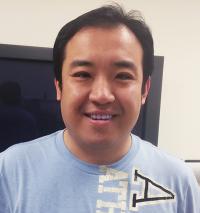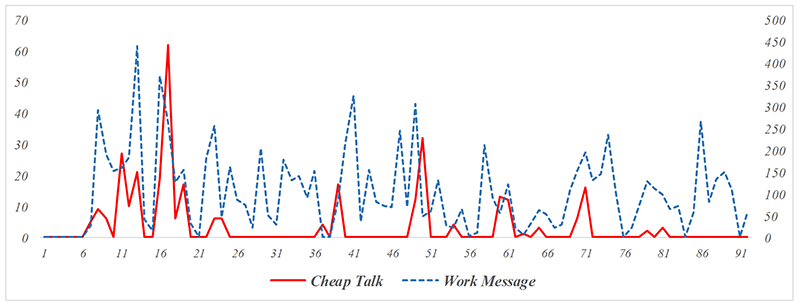Game of Trust
A software engineer in Mountain View needs trust to collaborate with his peer in Bangalore efficiently. But they may never have the opportunity to meet each other physically. Technology is not yet good enough to produce a mini-wormhole for them to enjoy a coffee break together, but it is good enough for them to share fun images of their lattes and chat about everyday topics while they enjoy their lattes remotely, using appli-cations such as Facebook Messenger. Managers often distress when team members interact this way, thinking it a waste of time. But does informally ‘talking’ about everyday things in such ways help team members to build trust, or does it just squander valuable development time?
 The answer is: it builds trust. Through the lens of evolutionary game theory, ISR Professor David Redmiles and his Ph.D. student Oliver Wang have investigated how trust emerges from such informal, non-work-related cheap talk that takes place over the Internet. Their research adapted the game theory classic Rousseau’s Stag Hunt, a natural description of mutual cooperation, to a model of globally distributed software development, and then analyzed the long-term dynamics of the resulting model. They conducted empirical studies of two open source projects (Apache Lucene and Chromium-OS) and found support for their game theory deductions.
The answer is: it builds trust. Through the lens of evolutionary game theory, ISR Professor David Redmiles and his Ph.D. student Oliver Wang have investigated how trust emerges from such informal, non-work-related cheap talk that takes place over the Internet. Their research adapted the game theory classic Rousseau’s Stag Hunt, a natural description of mutual cooperation, to a model of globally distributed software development, and then analyzed the long-term dynamics of the resulting model. They conducted empirical studies of two open source projects (Apache Lucene and Chromium-OS) and found support for their game theory deductions.
Software Development as Stag Hunt
In their model, software development is abstracted as a type of Stag Hunt game. In the Stag Hunt game, two players go out on a hunt and choose to go after a stag or a hare. To capture a stag, the two players must cooperate. If the players choose to work independently, they can instead individually capture a hare— which is worth less. If one player decides to cooperate but the other ‘defects’, the well-behaved, cooperative player will get nothing, but the defector can still hunt a hare independently. It is thus risky to be cooperative.
 Similar situations occur in globally distributed software development. In many cases, developers do not necessarily need to cooperate with others to get their jobs done (‘receive a hare’), even when their work items are highly interdependent. However, less cooperation may influence the quality of their work. Communication among developers can have significant influence on the quality of a software system even though work items can be finished independently. Thus, collaboration can produce higher quality work (‘receive a half stag’). When developers decide to cooperate, they take the risk that the others may not cooperate. Thus, they may experience some “unfavorable” results (e.g., fail to deliver a commitment on time) due to the others’ uncooperative behavior.
Similar situations occur in globally distributed software development. In many cases, developers do not necessarily need to cooperate with others to get their jobs done (‘receive a hare’), even when their work items are highly interdependent. However, less cooperation may influence the quality of their work. Communication among developers can have significant influence on the quality of a software system even though work items can be finished independently. Thus, collaboration can produce higher quality work (‘receive a half stag’). When developers decide to cooperate, they take the risk that the others may not cooperate. Thus, they may experience some “unfavorable” results (e.g., fail to deliver a commitment on time) due to the others’ uncooperative behavior.
By simply adding a new strategy that allows individuals to cheap talk with low cost before concrete cooperation begins, the whole team is very likely to reach a status where all team members become cooperative. After reaching this point, interesting things happen. Wang and Redmiles’ model shows that the amount of cheap talk drastically decreases to almost zero. Their model also suggests under which conditions trust can emerge.
Software Engineers Are Good Economists
“Software engineers are good economists; they are much more sensitive to their gain and loss than people usually are,” Wang commented. Talk over the Internet is cheap, but not free. It’s not the same as informal talk during an everyday working lunch or coffee break. “It takes extra work time or effort to chat on IM, to share pictures. But once software engineers know they can trust somebody and can expect them to behave cooperatively, they reduce the cheap talk,” says Wang. Empirical analyses conducted by Wang and Redmiles of the two open source projects’ IRC channel records reveal that the frequency of cheap talk quickly decreases after a relatively short period of time after the project starts (see figure below).

This research establishes a plausible explanation for why informal talk over the Internet helps increase globally distributed developers’ trust and cooperation. Cooperation with remote colleagues requires at least moderate trust. Without trust, individuals may not expect others to choose the cooperate strategy in their interactions, and thereby “defect” to avoid risk. Analysis of their case study finds a strong correlation between cheap talk and cooperation. With cheap talk acting as a catalyst, trust emerges from the collaboration and ensures cooperation. Cheap talk guarantees that the loss in a failed “cooperation trial” can be offset, leading to increased willingness to explore cooperation. So while cheap talk is not free, this type of interaction is cheap when compared with the benefits gained from the resulting cooperation.
Software engineers at different sites may not have “friendship” style trust to make them want to share everything in their life, but they can trust the others rationality. It seems good enough to “hunt a stag.” Wang adds, “So there’s no need to worry if you see your employees IM-ing about their favorite Indian food with their Bangalore colleagues.”
Future Directions
Redmiles and his team are planning to continue this work in two directions. Their current work focuses on incorporating a social network into the model they developed. They plan to add more social factors (e.g., social identity) into the model to improve its expressiveness, and more importantly, validate the model with empirical evidence. They also have a very ambitious research agenda to develop a set of tools to help globally distributed teams improve collaboration. These tools will be built on a game theory dynamic modeling and simulation engine that can generate meaningful and actionable recommendations to help teams with decision making. It is a long-term plan, requiring true interdisciplinary collaboration. Wang and Redmiles’ cheap talk research, has been supported by National Science Foundation grant 1111446. For more information on Wang and Redmiles’ research, visit: https://sites.google.com/site/oliverwangyi/ and http://cradl.ics.uci.edu.



